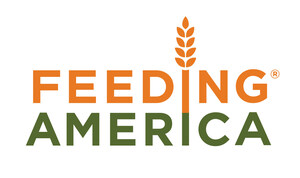Feeding America Responds to New USDA Report Stating that Latinos and African Americans are Most at Risk of Hunger
CHICAGO, Sept. 9, 2011 /PRNewswire-USNewswire/ -- A new report issued this week by The United States Department of Agriculture (USDA) found alarming rates of food insecurity among minorities.
In the general population, 1 in 6 Americans, 49 million, are currently living in households that are identified as food insecure, but the rates are much higher for Latinos and African Americans.
"The new USDA findings are disturbing. It is very upsetting that so many Americans struggle on a daily basis to find enough nutritious food to feed themselves and their families. But it is also particularly of concern that Latinos and African Americans are so disproportionately affected," said Vicki Escarra, president and CEO of Feeding America. "Our nation must do everything possible to help end these inequities. We must make sure that all American, especially our children, are properly nourished, so that they can lead healthy, happy and productive lives."
LATINO
- Rates of food insecurity were much higher among Latino households than the national average: more than 26 percent of Latino households versus nearly 15 percent of all households.
- More than one in four Latinos, 28 percent, or 13 million, is at risk of hunger.
- Nearly one-third of Latino children, 32 percent, or 5 million, are living in food insecure households.
"Hispanic families continue to be among the Americans most likely to grapple with food insecurity and hunger," said Janet Murguia, president and CEO of the National Council of La Raza, the largest national Latino civil rights and advocacy organization in the U.S. "It is vital that we improve access to healthy foods and strengthen nutrition assistance programs such as SNAP and WIC. However, over the long term, we also need comprehensive policies that address the economic and environmental factors that cause food insecurity in the Latino community."
AFRICAN AMERICAN
- Rates of food insecurity among Black, non-Hispanic households is nearly as high as in the Latino population, at approximately 25 percent, about the same rate reported last year.
- More than one in four African-Americans, 27 percent, or 10 million is at risk of hunger.
- More than one-third of African-American children, 3.7 million, are living in food insecure households.
"The report released by the USDA this week show that a disturbing number of African Americans don't have consistent access to three square meals a day. This is a situation which must change. We cannot allow so many people in our nation to live without enough food to lead healthy, productive lives," said Tavis Smiley, the broadcaster and philanthropist.
The new USDA report leads us to note another inequity borne by African-Americans and Latinos in the current economy.
Feeding America's Map the Meal Gap study, released in March 2011, found that unemployment is a strong driver of food insecurity. In December 2010 (the time of data collection for the USDA report), the unemployment rate for African Americans (15.8 percent) and Latinos (13 percent) was dramatically higher than that of whites (8.5 percent).
Since the USDA data was collected, the unemployment rates for whites and Latinos have decreased slightly, to 8 percent and 11.3 percent, respectively, in August, but the African American unemployment rate has increased to 16.7 percent. These findings suggest that food insecurity rates will remain disproportionately high for Latinos, and may actually increase for African Americans.
About Feeding America
Feeding America provides low-income individuals and families with the fuel to survive and even thrive. As the nation's leading domestic hunger-relief charity, our network members supply food to more than 37 million Americans each year, including 14 million children and 3 million seniors. Serving the entire United States, more than 200 member food banks support 61,000 agencies that address hunger in all of its forms. For more information on how you can fight hunger in your community and across the country, visit http://www.feedingamerica.org. Find us on Facebook at facebook.com/FeedingAmerica or follow our news on Twitter at twitter.com/FeedingAmerica.
Contact:
Ross Fraser
312-641-6422
SOURCE Feeding America
WANT YOUR COMPANY'S NEWS FEATURED ON PRNEWSWIRE.COM?
Newsrooms &
Influencers
Digital Media
Outlets
Journalists
Opted In





Share this article